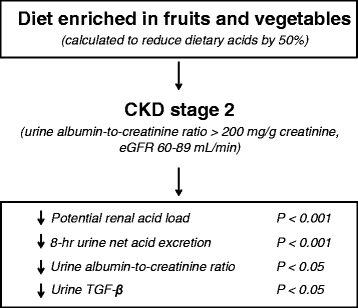Diets for patients with chronic kidney disease, should we reconsider?
- PMID: 27401192
- PMCID: PMC4940838
- DOI: 10.1186/s12882-016-0283-x
Diets for patients with chronic kidney disease, should we reconsider?
Abstract
Here we revisit how dietary factors could affect the treatment of patients with complications of chronic kidney disease (CKD), bringing to the attention of the reader the most recent developments in the field. We will briefly discuss five CKD-induced complications that are substantially improved by dietary manipulation: 1) metabolic acidosis and the progression of CKD; 2) improving the diet to take advantage of the benefits of angiotensin converting enzyme inhibitors (ACEi) on slowing the progression of CKD; 3) the diet and mineral bone disorders in CKD; 4) the safety of nutritional methods utilizing dietary protein restriction; and 5) evidence that new strategies can treat the loss of lean body mass that is commonly present in patients with CKD.
Figures

References
-
- Klahr S, Levey AS, Beck GJ, Caggiula AW, Hunsicker L, Kusek JW, Striker G. The effects of dietary protein restriction and blood-pressure control on the progression of chronic renal disease. Modification of Diet in Renal Disease Study Group. N Engl J Med. 1994;330(13):877–84. doi: 10.1056/NEJM199403313301301. - DOI - PubMed
-
- Reaich D, Channon SM, Scrimgeour CM, Daley SE, Wilkinson R, Goodship TH. Correction of acidosis in humans with CRF decreases protein degradation and amino acid oxidation. Am J Physiol. 1993;265(2 Pt 1):E230–5. - PubMed
MeSH terms
Substances
LinkOut - more resources
Full Text Sources
Other Literature Sources
Medical

